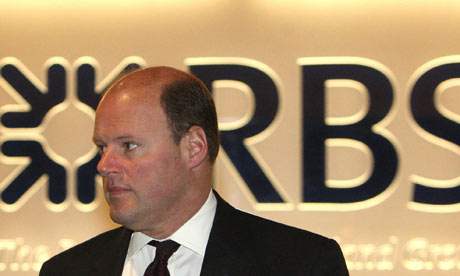Fury over RBS chief's £15m incentive to rebuild bank
• Unite 'appalled' by size of pay package
• Shareholders say price target could encourage risk-taking
• City institutions believe RBS should reconsider deal
- guardian.co.uk, Monday 22 June 2009 21.11 BST
- Article history

Stephen Hester, chief executive of the Royal Bank of Scotland: in line for a £9.6m pay package. Photograph: Dominic Lipinski/PA
A new pay deal for Stephen Hester, the Royal Bank of Scotland's chief executive, that could reach £15m provoked a furious reaction from unions, shareholders and politicians tonight as the state-controlled bank reignited the public furore over boardroom pay.
RBS was accused of missing an opportunity to set an example and put a lid on bankers' pay following the £20bn taxpayer bailout of the Edinburgh-based bank in which the government has a 70% stake.
Major City institutional investors believe the bank should reconsider Hester's pay package which comprises cash, shares, options, credit notes and debt and will pay out its maximum amount in three years if the taxpayer makes an estimated £8bn profit on its shareholding in the bank.
However, the call by RBS's traditional investors is likely to go unheeded as the deal has been ratified by UK Financial Investments (UKFI), the body that controls the government's stakes in the bailed-out banks.
While such intricate pay deals are often required to lure executives into tricky jobs, there was no mention of such a potentially lucrative package being put in place when Hester was plucked from property company British Land to replace Sir Fred Goodwin during the bank bailout in October. At the time, Hester was hired on a salary of £1.2m – a 50% rise on his pay as British Land chief executive – and awarded 10.4m shares, worth £5m, intended to buy him out of British Land incentive schemes.
But after discussions with UKFI and other shareholders, RBS was tonight trying to finalise a package that was branded a "one-way bet" by the Liberal Democrats.
The new pay deal comes as Goldman Sachs is expected to award staff the biggest bonus payments in its 140-year history after a surge in profits during the first half of the year. A lack of competition and huge government borrowing requirements are leading to soaring earnings for well-capitalised banks.
The details of Hester's pay package were also regarded as an indication that UKFI might begin to sell out of its shareholding in RBS once the share price reaches 70p – the level at which Hester will get his maximum payout. RBS shares were trading tonight at around 40p, indicating a loss for the taxpayer of £6bn on the 36.9bn shares it owns which were bought at an average price of 51p.
The pay deal is largely focused on the share price performance of the bank, rather than on other targets such as profitability. But one senior City banker last night defended the deal: "If Stephen can get the share price of RBS to 70p, then he will have made billions of pounds for the British taxpayer, rescued us all from a deep hole and would deserve more than just a big pay cheque – he ought to get a knighthood and a plinth in Trafalgar Square with his statue on."
Others, such as the Liberal Democrat Treasury spokesman Lord Oakeshott, were less impressed. "It exposes the black hole in government policy. UKFI should not have signed this package. Hester's job is to get lending again to business and families. That is his prime task, not ramping up the share price," Oakeshott said.
UKFI's support for the scale of Hester's package points to a divide between shareholders of RBS. While UKFI wants to ramp up the bank's share price, giving the taxpayer the biggest possible profit as quickly as possible, City investors such as those represented by the Association of British Insurers want a longer-term approach.
Peter Montagnon, head of investment affairs at the ABI, made it clear that City investors did not want to cause another "public row" after the furore surrounding the pension for Goodwin who last week agreed to a reduction in his £16.9m pension pot. But he said: "We have to be continually aware of the different priorities of UKFI, which has a clear interest in a profitable exit, and the interests of long-term investors who will stick with the bank for the future. There would still be some merit in considering whether a proportion of the award should be deferred after the three-year performance period."
Montagnon argued that this would demonstrate the new management's commitment to restoring the loss-making bank back to health.
RBS refused to confirm details of the pay deal for Hester, who is not planning to use any of the £300,000 of corporate hospitality being spent by the bank during Wimbledon fortnight.
Graham Goddard, deputy general secretary of the union Unite, said the deal would be met with "absolute disbelief" by staff in the finance industry where thousands of jobs have already been lost this year, including 4,500 at RBS. He said: "Unite is appalled that instead of striving to save jobs in this state-controlled bank, UKFI is approving such an incentive plan. Staff and customers are sick of seeing senior bankers earn such huge financial awards when, every week, hundreds of hard-working and loyal staff are losing their jobs."
Roger Lawson, of the RBS Shareholders Action Group, said: "It is absolutely outrageous that the government does not use its power to bring the remuneration of bankers in these companies down to a reasonable level. Do they need to pay him this much to make him work harder?"

No comments:
Post a Comment